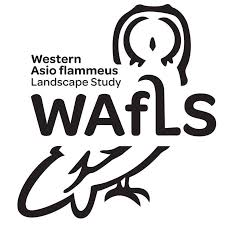Registration for the 2020 Western Asio flammeus Landscape Study (WAfLS) is right around the corner!
Registration for new participants opens on January 10th, 2020.
Would you like to make a valuable impact as a community scientist? An impact so significant that it can have far-reaching effects influencing conservation management efforts for the survival of a species?
If so, we invite you to participate in the largest survey of Short-eared Owls in the world! Learn about this important study and how you, a community scientist, can play a vital role in the driving force for Short-eared Owl conservation.
Why Do We Need WAfLS?
The Intermountain Bird Observatory and the Idaho Bird Conservation Partnership operate a community scientist-based survey for Short-eared Owls in Idaho that extends through partners across eight western states. Traditional survey data have indicated that Short-eared Owl populations have declined by more than 60% in the last 40 years. The National Audubon Climate Initiative has rated the Short-eared Owl as "Climate Endangered", and the Idaho Fish and Game have identified the Species as a "Species of Greatest Conservation Need." We have the opportunity to influence and focus conservation and restoration activities for this species, but only if we have solid data. We have developed this survey to address this gap. Past year's results have directly influenced the Idaho State Wildlife Action Plan, resulted in a scientific publication, multiple scientific presentations (Idaho and International Conferences), and direct outreach and education opportunities. Our success also fueled the expansion of this study west-wide to now include a total of eight western states and community scientist participation has swelled over 800 surveyors!
What Is the Best Time for WAfLS?
The survey requires two 1.5-hour visits, each occurring in a separate 3-week window (March, April, and May). The timing for a given route is dependent upon elevation. It is a road-based survey (8 - 11 points along a secondary road, separated by 1/2 mile) that is completed starting 100 minutes before darkness and finishing 10 minutes after darkness. The survey timing is set to coincide with the Short-eared Owls elaborate courtship displays.
Check out this video from our co-organizer (Neil Paprocki of Hawkwatch International) in Utah
Where Can You Get More WAfLS?
- For more details, head to the Avian Knowledge Northwest Network website.
- Contact the Idaho State Coordinator to request placement on the official invitation list at heathermhayes@boisestate.edu
- Like us on Facebook at “Project WAfLS” for the latest updates.







